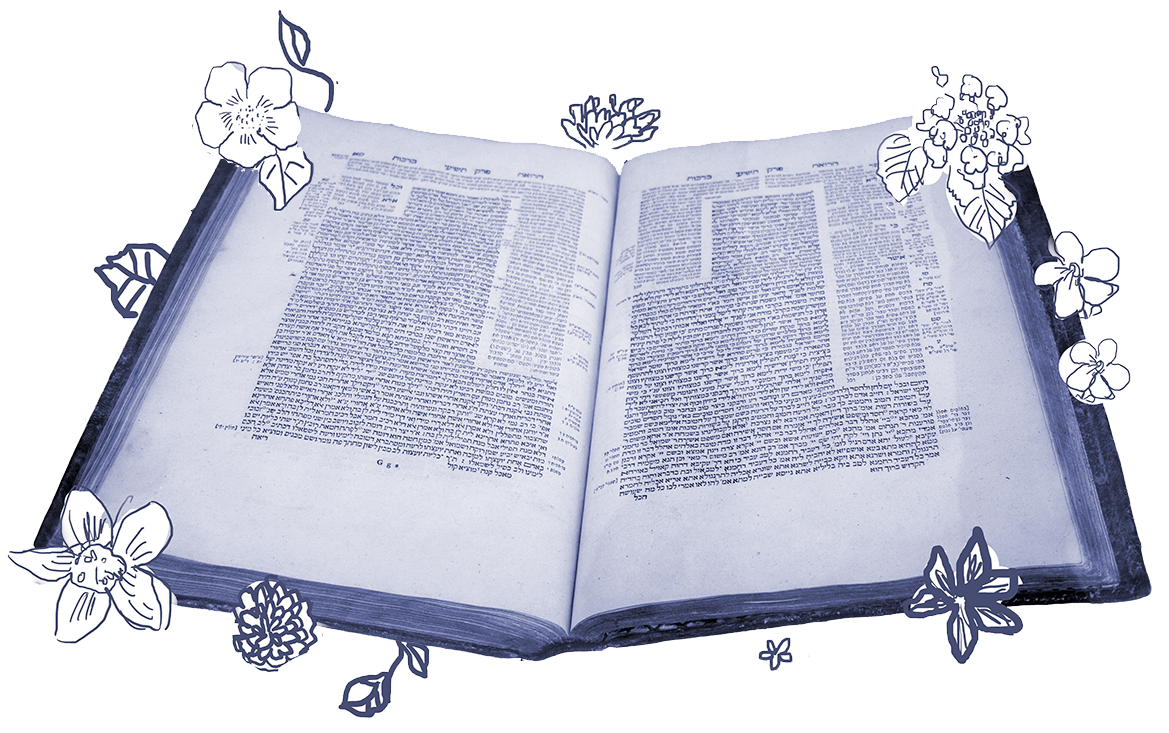We’re still in the middle of a lengthy elaboration of rabbinic undertakings designed to foster darkhei shalom – the ways of peace. Our daf explores how this principle applies to gleaning, the biblical obligation to leave certain parts of one’s harvest to people who are poor and to the ger. In the biblical period, ger meant foreigner (i.e. non-Jew) but for the rabbis this word is usually taken to mean converts to Judaism. For them, likely the law meant one should save gleanings for people who were financially poor and for converts who were poor in a different way — because the latter would have had no inheritance in the land dating to biblical times and presumably had more limited access to food.
The mishnah undergirding today’s daf lays out two practices grounded in darkhei shalom. First, if a person experiencing poverty is gleaning from the uppermost part of an olive tree, any olives that fall during their efforts are theirs, and anyone who snatches them off the ground has robbed them. Second, poor gentiles are permitted to take part in gleaning, even if the Torah specifies the gleanings for poor Jews (according to the rabbinic understanding).
In the first part of the Gemara’s discussion, we learn that it’s not just olives that happen to fall from the branches while the gleaner is in the treetops; if the person plucks olives, holds them, and then drops them to the ground, these olives, too, belong to that person. Now we get an interesting narrative illustration:
The Gemara relates that Rav Kahana was once walking to the city of Huzal when he saw a certain man throwing sticks at a palm tree, causing dates to fall to the ground. Rav Kahana went, gathered up some of the dates, and ate them.
Clearly, Rav Kahana thinks that the dates brought down by thrown sticks are not the same as olives shaken or plucked off a tree by a gleaner. So, he eats them. But the man throwing sticks is about to challenge what he clearly views as a theft:
That man said to Rav Kahana: See, Master, that I threw them down with my hand (i.e., the dates were already legally mine).
Rav Kahana said to him: You are from the place of Rabbi Yoshiya, who was a great sage in the city of Huzal. For that reason, you are knowledgeable in halakhah.
Rav Kahana seems to accept the stick-thrower’s legal argument, and credits his colleague Rabbi Yoshiya with the latter’s knowledge. The commentary on this passage indicates that it’s intended to offer praise of Rabbi Yoshiya and the impact of his teaching on his city’s residents, even after his death.
But Rav Kahana’s behavior is also questionable: Why did he think he had rights to the dates the man brought down by throwing sticks? Did he consider the dates to be falling on their own, and therefore fair game? Did he believe that the mishnah’s direction applied only to olive trees (as Tosafot speculate) and therefore not to dates? Could he have believed the stick-throwing gleaner had abandoned them, as the Rashash considers, or that he wasn’t Jewish and therefore the halakhah didn’t apply to him, as the Rashba suggests? Or worse, might he have been trying to take advantage of the gleaner’s possible ignorance? While we don’t have a definitive answer to his thinking, Rav Kahana appears to at least accept the gleaner’s assertion and gentle rebuke.
As if anticipating the Rashba’s concern, that Rav Kahana judged the gleaner a gentile and therefore without rights to the fallen dates, we also learn in the Gemara about darkhei shalom’s impact on relations with non-Jews even beyond gleaning:
The mishnah teaches: One does not protest against poor gentiles who come to take gleanings, forgotten sheaves and the produce in the corner of the field, which is given to the poor, although they are meant exclusively for the Jewish poor — on account of the ways of peace.
Similarly, the sages taught in a beraita (Tosefta 5:4): One sustains poor gentiles along with poor Jews, and one visits sick gentiles along with sick Jews and one buries dead gentiles along with dead Jews. All this is done on account of the ways of peace.
Although the Mishnah speaks only about gleaning, the Gemara relies on the Tosefta to extend the idea of treating gentiles in the same way as one treats Jews to a variety of other realms, including visiting the sick, burying the dead and giving tzedakah. All this is done to bolster peaceful relations between Jews and non-Jews.
It’s difficult to catalogue all the places in rabbinic literature that discuss the greatness and primacy of peace. Sometimes, that means peace between a husband and wife and sometimes it means peace between Jewish neighbors. Sometimes it means peace between people of different social status and sometimes it means peace between strangers transacting business. On today’s daf, we are reminded that it also means maintaining peaceful relationships outside of the Jewish community by according non-Jews some of the care and rights that are only explicitly reserved for those within the Jewish community.
Read all of Gittin 61 on Sefaria.
This piece originally appeared in a My Jewish Learning Daf Yomi email newsletter sent on July 16th, 2023. If you are interested in receiving the newsletter, sign up here.



